Friday, December 4, 2009
Today's Video: Praise the pancake and pass the syrup
Online Source - YouTube
The Good, the Bad and the Ugly: The World Cup draw
 The 2010 World Cup draw took place earlier today in Cape Town, South Africa. So how did the luck of the draw affect the qualified teams from the Americas? Here’s a quick look at a few of the teams from where I sit:
The 2010 World Cup draw took place earlier today in Cape Town, South Africa. So how did the luck of the draw affect the qualified teams from the Americas? Here’s a quick look at a few of the teams from where I sit:Lo Bueno
- U.S. - The U.S. was drawn into Group C with tourney favorites England but also African minnows Algeria and European side Slovenia. Los gringos should make it out of the group phase (before probably getting blown out by Germany in the second round).
- Argentina – Despite qualifying to the World Cup on the final date Argentina was seeded as one of the group leaders. Their rivals (South Korea, Nigeria, Greece) should be relatively easy and they should reach the quarters if head coach Diego Maradona can keep his head together.
Lo Malo
- Mexico – El Tri will be facing extra pressure in that they will be playing the hosts South Africa in the inaugural game of the tourney. Their road to the second round may be bumpy in facing a strong French side and a physical Uruguayan team.
- Paraguay – The South Americans are in Group F along with defending champs Italy but also with one of the weakest teams in New Zealand. The key match will be against Slovakia with the winner likely to qualify into the next stage.
Lo Feo
- Brazil – In every World Cup there is a “Group of Death” and surely that can be designated to Group H. Brazil will definitely need to play its A-game against a stacked Portugal, one of the strongest African sides in the Ivory Coast, and possible dark horses North Korea.
- Honduras – Simply put, Honduras will need plenty of luck to at least get a point against Spain, Chile, and Switzerland.
Click here to check out the configuration and match dates of all eight groups. Let the speculation begin!
Image- BBC Sport (Italy is the reigning World Cup champion).
Online Sources- Guanabee, FIFA.com
Ecuadorian side captures Sudamericana
 We'll discuss the 2010 World Cup draw later today, though if you can’t wait please check out Guanabee’s liveblog of the ceremony.
We'll discuss the 2010 World Cup draw later today, though if you can’t wait please check out Guanabee’s liveblog of the ceremony.Care to hazard which soccer team is currently the best in South America? It isn’t a traditional powerhouse like Argentina’s Boca Juniors or a Brazilian side like Palmeiras. It isn’t even a Southern Cone squad like Uruguay’s Penarol or Colo Colo of Chile.
Try Liga Deportiva Univeristaria de Quito.
The Ecuadorian squad cemented their status as the hottest futbolistas of South America after winning the Copa Sudamericana this week. Despite losing the second leg of the final against Brazilian heavyweights Fluminese, LDU de Quito captured the Sudamericana by a 5-4 aggregate score. Thus, the fashioned Ecuadorian side captured their third regional title in less than two years (Copa Libertadores in 2008 and the Recopa Sudamericana in 2008).
What accounts for LDU de Quito’s success? Part of it is their stellar play in the high altitude of their home pitch but there are other factors too:
Liga's undisputed success is a combination of several factors, most notably its infrastructure and the impressive board of intelligent, hardworking people, who had planned meticulously to take Liga to the next level. Leading club directors, the father-and-son duo of Rodrigo and Esteban Paz, have been at the head of Liga's rise to prominence. For years, they've been transforming the club into a South American heavyweight, and with dedication, hard work and patience, they finally have their juggernaut…
The signings this year of Ecuadorian national-team veterans Édison Méndez and Ulises de la Cruz, two experienced players who spent considerable time in Europe's big leagues, made all of the difference for Liga. The fact the club board also kept prolific Argentine striker Claudio Bieler was also important, as he topped the Sudamericana scoring charts with eight goals.
Image- SI.com
Online Sources- Guanabee, ESPN, SI.com
Daily Headlines: December 4, 2009
 * Peru: The country’s Candoshi natives could soon disappear after being ravaged by a hepatitis B outbreak according to their tribal leader.
* Peru: The country’s Candoshi natives could soon disappear after being ravaged by a hepatitis B outbreak according to their tribal leader.* Honduras: Could Brazil soon flip-flop and recognize the results of Honduras’ recent presidential elections?
* Latin America: Colombia has drastically cut its electricity exports to Ecuador and Venezuela reportedly due to the dry weather.
* Cuba: A group of “prominent African Americans” including professor Cornel West and actress Ruby Dee Davis have called on the Cuban government to do more to combat discrimination against Afro-Cubans.
Image – AFP (“Peruvian natives in the Peruvian Amazonian town of Yurimaguas.”)
Online Sources- Al Jazeera English, Xinhua, LAHT, Miami Herald
Thursday, December 3, 2009
World Watch: Bhopal, 25 years later
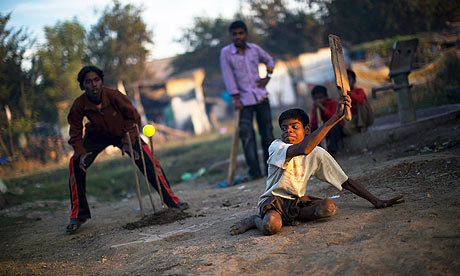 * India: The 25th-anniversary of the Bhopal disaster was observed with different ceremonies including a protest calling for greater accountability from Dow Chemical.
* India: The 25th-anniversary of the Bhopal disaster was observed with different ceremonies including a protest calling for greater accountability from Dow Chemical.* Switzerland: Catholic and Jewish groups have joined in protest against Switzerland’s referendum outlawing the construction of new minarets.
* Somalia: At least 19 people were killed when a bomb exploded during a graduation ceremony in the Somali capital of Mogadishu.
* China: A local court sentenced five people to death in relation to July’s ethnic riots in western China.
Image – Guardian UK (“Bhopal teenager Sachin Kumar, whose legs were rendered practically useless by a birth defect, plays cricket with his friends near the deserted Union Carbide factory Photograph: Daniel Berehulak/Getty Images.”)
Online Sources- Scotsman.com, Catholic News Agency, Jerusalem Post, BBC News, Washington Post
Comic Relief: Zelaya's Embassy Ordeal
 When the 2006 Honduran presidential campaign got a little nasty, supporters of current president-elect Pepe Lobo frequently pointed out that deposed president Mel Zelaya never finished his university education.
When the 2006 Honduran presidential campaign got a little nasty, supporters of current president-elect Pepe Lobo frequently pointed out that deposed president Mel Zelaya never finished his university education.Now that the amount of goodwill from Lobo's supports towards Zelaya is basically nil, it's easy to imagine Mel's critics having a good chuckle over the anecdotes the Miami Herald unearthed about Zelaya's ongoing confinement at the Brazilian embassy.
The most interesting detail of Zelaya's time in capacity should spawn at least a couple good political cartoons:
"Supporters wrapped Zelaya's room in foil to protect him from the radiation waves to block cellphones, which they believed were harmful."
Any chance that could possibly be effective?
Image Source: Miami Herald
Online Sources: Wikipedia, Miami Herald
Brazil Looks to "Gringos" to Save the Amazon

A little over a month ago, we reported that Ecuador was asking Europe to pay to halt drilling in the oil-rich Yasuni National Park in the Ecuadorian region of the Amazon. Now Brazil's president, Luiz Inacio Lula da Silva (more commonly known as Lula) is saying that "gringos" should pay to help preserve the Amazon.
"I don't want any gringo asking us to let an Amazon resident die of hunger under a tree," Silva said. "We want to preserve, but they will have to pay the price for this preservation because we never destroyed our forest like they mowed theirs down a century ago."
Lula has stated that since Western nations have already destroyed their own forests, they should pay to help preserve the Amazon. He also said that Western nations contribute more toward environmental destruction than other loggers and farmers. Lula mentioned the false notions that people have about the Amazon and the lack of understanding that about 25 million people live in the Brazilian portion of the Amazon. Sixty percent of the Amazon is in Brazil and the country has been working to reduce destruction in the area. The Amazon absorbs carbon dioxide and is thought to be the world's greatest natural defense against global warming.
Online Source: Associated Press
Image Source: Wikimedia
Obama Boosts US Image in Latin America
 As domestic criticism heats up for President Obama, the US leader might want to consider a vacation to the friendly confines of Latin America. Following the abysmal record of his predecessor, Obama's tenure as US president has led to increased goodwill towards to the US throughout the region.
As domestic criticism heats up for President Obama, the US leader might want to consider a vacation to the friendly confines of Latin America. Following the abysmal record of his predecessor, Obama's tenure as US president has led to increased goodwill towards to the US throughout the region.The most interesting tidbits from the Gallup survey collected between July and September:
Who knows, the president may even take the news to mean he should plan a stay at the Caracas Hilton. Oops, I mean the Alba Caracas...
Image Source: Gallup
Online Sources: Gallup, Examiner, BBC, Guardian
Today's Video: Empowerment
Today marks the International Day of Persons with Disabilities and according to the U.N. people with disabilities worldwide still encounter discrimination and marginalization:
(U.N. High Commissioner for Human Rights Navi) Pillay said disabilities were widespread. "Estimates indicate that more than 10 percent of the world's population have a disability themselves or have a close family member with one, and that in a quarter of all households there is someone with some sort of disability." he said.
Disabilities also disproportionately affect the poor. "According to UNESCO, more than 90 percent of children with disabilities in developing countries do not attend school," Pillay said.
From what I’ve observed as a wheelchair-bound person who has occasionally traveled to Latin America, there has been a gradual changing of attitudes towards the disabled. Yes there are those who view disabled individuals with pity but there seems to be more people who understand that the disabled generally seek empowerment and equality. The following video from The Advocacy Project touches on this in the form of an El Salvadoran landmine victim grateful with his job:
I was fortunate to use the Transmilenio bus system when I was in the Colombian capital of Bogota, a public transit option that has facilitated travel for people with disabilities. Yet access to the network is hindered by its cost (compared to other choices for travel) as well as the crumbling infrastructure (e.g. broken sidewalks, street potholes) near some of the stations. This seems to be symbolic of the hindrances facing the disabled in Latin America; there have been some notable advances yet much more needs to be done.
Online Sources- Wikipedia, Xinhua, YouTube
Daily Headlines: December 3, 2009
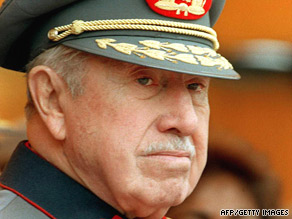 * Chile: Spanish Judge Baltasar Garzón ordered that the widow of ex-dictator Augusto Pinochet post a $77 million bond after being suspected of money laundering for her late husband.
* Chile: Spanish Judge Baltasar Garzón ordered that the widow of ex-dictator Augusto Pinochet post a $77 million bond after being suspected of money laundering for her late husband. * Venezuela: After having nationalized several private banks earlier this week Venezuelan president Hugo Chavez threatened more banks with state intervention.
* Mexico: Authorities discovered a tunnel below the U.S.-Mexico measuring nearly 1000 feet in length.
* Latin America: According to the World Bank, Latin America is in a better position than other regions to survive the effects of a possible Dubai debt default.
Image – CNN
Online Sources- Bloomberg, Reuters, MSNBC, New York Times, The Latin Americanist
Wednesday, December 2, 2009
Honduran Congress rejects Zelaya return
 After hours of debate Honduras’ legislature decided not to permit ousted president Manuel Zelaya to finish his term in office.
After hours of debate Honduras’ legislature decided not to permit ousted president Manuel Zelaya to finish his term in office.Of the 126 members of Congress at least 64 MPs voted against reinstating Zelaya whose presidency officially ends next month with a mere ten legislators voting for reinstatement. Furthermore, the office of Honduras’ Attorney General concluded that it would be “inadmissible and inacceptable” to return the leader who was forcefully exiled last June.
While dozens of Zelaya backers protested outside the congressional building, the expelled leader remained defiant:
Mr. Zelaya, who was ousted in June, had told the BBC that he would refuse reinstatement because he did not want "to legitimize a coup"…
Speaking to BBC Mundo from inside the Brazilian embassy where he took refuge in September, he said: "Will the elections change the military leadership that conducted the coup that ousted me? It remains the same. Will the elections change the composition of the Supreme Court that issued an arrest warrant [against me] without due cause? It remains the same," Mr. Zelaya said.
Conservative Porfirio "Pepe" Lobo became president-elect on Sunday in elections that have not received full international recognition.
Image- Al Jazeera English
Online Sources- AFP, Hondudiario, El Heraldo, Xinhua, BBC News, The Latin Americanist
Carribean Nation still wants British Queen
Eastern Caribbean nation of St. Vincent and the Grenadines voted in a referendum to reject a plan to replace her with a president chosen by Parliament. The outcome of the votes has decided to keep the Queen of Great Britain as their 'formal leader'.
The primaries resulted in a 56 percent rejection against the change, even though both of the country’s parties desired to replace the queen with a president as head of state.
Quite an unusual outcome, however it does not seem likely that the referendum will stop the nation's bi-partisan desire for a President rather than a Queen.
Photo Source
Opposition leaders had urged voters to reject the proposal, arguing that it did not sufficiently reduce the powers of the prime minister, who would remain as head of government. They also said citizens, rather than Parliament, should elect the president.
Follow-up: Hoax behind Peruvian fat ring
 Last month we mentioned about a suspected Peruvian criminal gang that allegedly trafficked in human fat. A pair of commentators expressed their doubts over their story and their skepticism was proven correct. However, the truth behind the story appears to be grisly and very discomforting:
Last month we mentioned about a suspected Peruvian criminal gang that allegedly trafficked in human fat. A pair of commentators expressed their doubts over their story and their skepticism was proven correct. However, the truth behind the story appears to be grisly and very discomforting:
Police General Eusebio Felix Murga was removed less than two weeks after telling a press conference that four Peruvians had been detained and two unnamed Italians were sought for buying human fat for as much as 15,000 dollars a liter to be used in European cosmetics.
National police chief Miguel Hidalgo told reporters that Felix Murga would be transferred to another post and that "an investigation was launched to determine the truthfulness of the case of the gang," after local news reports contradicted the police and no evidence seemed to back up the police claims.
Investigators are also looking into whether Murga may have had a role in the death a man that officials said was the only victim rather than the sixty initially claimed by Murga. In the meantime, the mayor of the region where Murga was headquartered has bemoaned the “ruse of bad taste" which has affected the area’s image.
Image- BBC News
Online Sources- BBC News, The Latin Americanist, AFP, Reuters
Another Protected Witness is a Victim of Drug Violence in Mexico
 A former federal policeman,Edgar Bayardo, was gunned down in a Starbucks in Mexico City on Tuesday. Bayardo was a protected witness in a drug corruption case, whose murder marks the second death of a high-profile witness in Mexico in less than two weeks.
A former federal policeman,Edgar Bayardo, was gunned down in a Starbucks in Mexico City on Tuesday. Bayardo was a protected witness in a drug corruption case, whose murder marks the second death of a high-profile witness in Mexico in less than two weeks.Authorities believe that the killing bore all the hallmarks of an organized crime execution. "By the methods used ... this falls outside the realm of common crime," said Slomianski Aguilar.
Back in 2008 Bayardo was detained during the large-scale drug corruption cleanup that reached high into Mexican federal police and prosecutor's office. Federal authorities had suspected him of collaborating with the powerful Sinaloa drug cartel that has swept up Mexico.
Shortly after, Bayardo was released from house arrest and declared a protected witness, said federal and local prosecutors, who spoke on condition of anonymity.
According to the Associated Press, the penetration of the federal system leaves officials understandably uneasy:
Photo Source
Observers and former law enforcement officials said the Bayardo slaying raised questions about Mexico's protected witness program and illustrated the powerful reach of the cartels.
"Obviously, they (prosecutors) should have been providing significant protection because of the kind of accusations he (Bayardo) made," former top anti-drug prosecutor Samuel Gonzalez said, referring to the fact that Bayardo reportedly implicated other top police officials in corruption. "So this is a very serious failure for the agency charged with protecting him."
"These incidents ... show that it is far too easy for criminal organizations to penetrate security arrangements," Oliva said. "The situation is getting worse all the time, and instead of seeing improvement in security, we're seeing more problems."
Miercoles Musical: A Yuletide treat
Online Sources- Variety, YouTube
Daily Headlines: December 2, 2009
 * Argentina: Hours before Latin America’s first official gay marriage was to take place yesterday an Argentine judge ordered that the historic ceremony be suspended.
* Argentina: Hours before Latin America’s first official gay marriage was to take place yesterday an Argentine judge ordered that the historic ceremony be suspended.* Mexico: The mother of the figure believed to be of Zapatista rebel leader Subcomandante Marcos died at the age of 70.
* Latin America: The FBI will return over 150 pre-Columbian artifacts, including some over 3000 years old, which were smuggled out of Peru and Ecuador.
* Brazil: Some Brazilians are peeved at Robin Williams after the comedian joked that Rio de Janeiro used "50 strippers and a pound of blow" to win the 2016 Olympics bid.
Image – CBC (“Jose Maria Di Bello, left, and Alex Freyre were going to marry on World AIDS Day until a national judge blocked the wedding. (Natacha Pisarenko/Associated Press)”).
Online Sources- AP, AFP, MSNBC, The Latin Americanist, Reuters
Tuesday, December 1, 2009
Notable Quotable: A perspective on Honduras
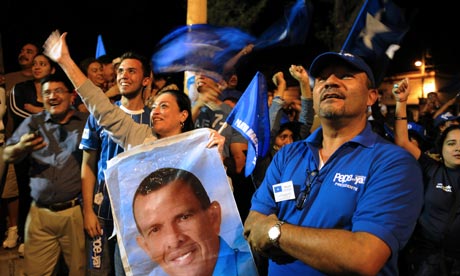
The real problem is that the apparent success of the election lets the orchestrators of the coup get away scot-free after casually kicking out an elected official. It is one thing to convince the international community to turn a blind eye to a crass deposition of a legitimate president; it is quite another to achieve that without paying any price whatsoever for it. The coup team has now accomplished both. And so the shortcomings of the Honduras's rotten political system have simply been crystallized.---Former Costa Rican vice president and current Brookings Institution senior fellow Kevin Casas-Zamora gave his two cents on Sunday’s Honduran elections.
In the roughly two days since the ballots closed president-elect Porfirio Lobo has called for unity in a very deeply divided, volatile, and impoverished Honduras. He will have to work fast to earn international recognition of the elections; the latest Ibero-American Summit ended on Tuesday with a lack of consensus over the legitimacy of Sunday’s elections.
Should the elections be recognized regardless of the nature of Manuel Zelaya’s ouster? Are coups (military or civilian) justified in a democracy? Will Porfirio Lobo survive his term in the Honduran presidency? Could the political problems in Honduras manifest themselves in other Latin American countries?
In short, what do you think?
Image- Guardian UK (Supporters of Porfirio Lobo celebrated his victory in the Honduran presidential elections).
Online Sources- Foreign Policy, BBC News, The Latin Americanist, Xinhua
Remittances to Mexico nosedive
 Last month we mentioned how an increasing number of Mexicans are sending money transfers to their compatriots north of the border in the U.S. As the Mexican economy has been struggling in a recession, a recent New York Times piece observed how remittances to Mexico have gradually dropped since 2008.
Last month we mentioned how an increasing number of Mexicans are sending money transfers to their compatriots north of the border in the U.S. As the Mexican economy has been struggling in a recession, a recent New York Times piece observed how remittances to Mexico have gradually dropped since 2008.The latest numbers on money transfers from Mexico's central bank were expected to be bad but they were worse than anticipated:
The Bank of Mexico said Tuesday that remittances to Mexico fell 36% to $1.69 billion in October from $2.64 billion in the same month last year.In addition, bank officials have blamed the declining remittances on “the U.S. economic downturn, particularly in the construction market”. Yet with remittances accounting for Mexico's second largest source of foreign income, a sharp decline in money transfers is a bad sign for the country’s economy.
The October numbers were also lower than the $1.74 billion that Mexican workers sent home in September, the central bank said.
Remittances for the first 10 months of the year fell 16% from the year-earlier period, to $18.13 billion.
Image- BBC News
Online Sources- The Latin Americanist, New York Times, Wall Street Journal, MSNBC
Former Miss Argentina Dies from Plastic Surgery

Argentina, a country ranking only eleventh in the world for plastic surgeries per capita, has lost a beauty queen. Former Miss Argentina (1994), Solange Magnano, died at the age of 37 after complications resulting from her elective surgery on her buttocks. Three days after undergoing gluteoplasty, a plastic surgery procedure enhancing the buttocks, Magnano died as a result of the injections used for the operation. The liquid from the injections traveled to her lungs and brain. This condition is otherwise known as pulmonary embolism, a blockage of the main artery of the lung caused by a substance in the body which travels through the bloodstream. Magnano leaves behind her two 7 -year-old twin daughters.
Today’s Video: World AIDS Day
The video below is a 2008 news report from Al Jazeera English that looked at the discrimination faced by Mexicans with HIV/AIDS and the health care issues related to the illness.
Online Sources- Baltimore Sun, Reuters, LAHT, YouTube
Daily Headlines: December 1, 2009
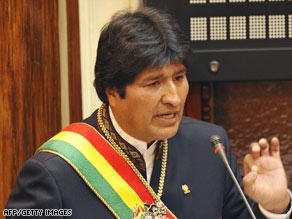 * Bolivia: Days before Bolivia’s federal elections a nationwide poll showed that President Evo Morales will easily win reelection.
* Bolivia: Days before Bolivia’s federal elections a nationwide poll showed that President Evo Morales will easily win reelection.* Mexico: "We should focus on what we have in common," said Los Angeles Mayor Antonio Villaraigosa regarding immigration during his visit to Mexico City.
* Latin America: According to the mayor of a Colombian border town over 600 Brazilians Colombians and Ecuadorianswere expelled from Venezuela after being accused of illegal mining.
* Argentina: Star striker Lionel Messi won the Ballon d'Or as Europe’s top soccer player of the year.
Image – CNN
Online Sources- LAHT, Reuters, BBC Sport, San Jose Mercury News
Monday, November 30, 2009
Today's Video: Nationalization of Venezuelan Banks Possibly Spurred by Political Beef
Not a good surprise for employees of Banco Canarias who showed up for work on Monday.
Video Source: Reuters
The Ibero American Summit's View on the Coup in Honduras
 The Ibero-American Summit consists of 22 countries this year, that began in Estoril, Portugal on Sunday. One of the main issues at the summit was the coup in Honduras, and what to do about it.
The Ibero-American Summit consists of 22 countries this year, that began in Estoril, Portugal on Sunday. One of the main issues at the summit was the coup in Honduras, and what to do about it.Many foreign ministers could not reach a common standpoint on whether or not they should recognize the outcome of the Honduran elections staged by the de facto government.
As of now, the conflict remains stagnant with the lack of cohesion amongst latin nations.
Below are some of the opinions of various nations' representatives, according to MercoPress:
"We do not recognize those who carried out the coup" that ousted Zelaya on June 28, Bolivian Foreign Minister David Choquehuanca told the German Press Agency DPA.
"What is at stake is whether we validate or not a new methodology of coups d'etat," said Argentine Foreign Minister Jorge Taiana, whose country was seeking a rejection of the elections along with Bolivia, Cuba, Brazil, Spain, Venezuela, Ecuador, Paraguay, Guatemala and Chile.
"The elections represent a step ahead" said Panamanian Foreign Minister Juan Carlos Varela"(The coup) was six months ago, and we need to look to the future of 6 million Hondurans."
Photo Source
Wyoming, Honduras
 Regional governments continue to be divided over whether to recognize (or in the Spanish case "neither recognize nor ignore") yesterday's win for Pepe Lobo in the Honduran elections.
Regional governments continue to be divided over whether to recognize (or in the Spanish case "neither recognize nor ignore") yesterday's win for Pepe Lobo in the Honduran elections.The crisis has shown a leveling of the playing field when it comes to which outside powers hold the most sway in Honduras. But the basic fact that outsiders will have a say in Honduras' internal affairs remains unquestioned.
On this note, an entertaining Google News alert landed in my inbox today with the Casper, Wyoming Star-Tribune's profile of a Wyoming man who years ago was imprisoned for attempting to assassinate former Panamanian strongman Manuel Noriega.
Tom Bleming, who spent nearly two years in jail in Panama after the ill-fated Noriega plot, now finds himself among the international cadre of ardent Zelaya supporters and even gained access to underground opposition groups during his recent trip to Honduras.
With Zelaya's chances of getting back to power now nearly zero, it will be interesting to see if how long he remains a cause celebre for his international supporters.
Image Source: Wyoming Star-Tribune (Courtesy Tom Bleming)
Online Sources: Wall Street Journal, 1st Lead, Wyoming Star-Tribune
Shakira Represents Non--Profit at Ibero-American Summit
 November 30, Estoril, Portugal--The infamous symbol of Latina success , Shakira, ships out to Portugal today to represent the non-profit organization ALAS.
November 30, Estoril, Portugal--The infamous symbol of Latina success , Shakira, ships out to Portugal today to represent the non-profit organization ALAS.ALAS is known for its prominent affiliations with Latin American artists, business leaders and intellectuals. Their goal is to mobilize Latin-American society towards the implementation of integrated early childhood public policies, so that every child from zero to six years old has access to health plans, education and nutrition.
Shakira has completed many acts of philanthropy to help out the youth from her homeland, Colombia. In fact, she has decided to open up five schools in her hometown Barranquilla, Columbia, and recently made a trip to Chile to highlight a serious issue of Latin America’s underprivileged youth and their poverty.
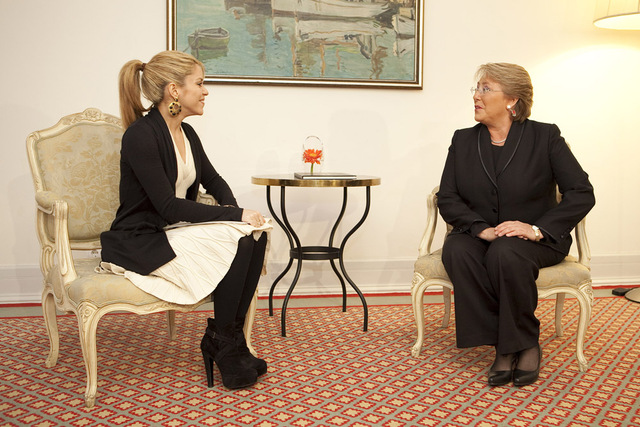
While in Chile, Shakira had also met President Michelle Bachelet to discus keeping children off the streets and into schools -- in hopes to give them a healthier and happier childhood.
While in Portugal, Shakira and renowned economist, Jeffrey Sachs of Columbia University will present various chilren's issues regarding health care and education.During the Summit, ALAS will also sign a partnership with the Organization of the Ibero-American States (OEI) to promote the Early Childhood Component of the Program "Education Goals 2021: the Education we want for the Generation of the Bicentenaries", which seeks to provide universal education coverage in the region by 2021.
Amongst the recent debut of her new album, She Wolf, Shakira still allocates time to her second love: charity.
Photo Source: 1, 2
Ahmadinejad visit wrap-up

After Iranian leader Mahmoud Ahmadinejad's visit to Latin America, let's check in on the murmurings in the blogosphere:
Saying "a new movement has started to free the world from domination of a few bullying states," Ahmadinejad reported that the region was growing, and that closer ties between Iran and Latin America were established.
Voice of America writes that the Iranian leader received military honors as he arrived in La Paz, Bolivia.
The Wall Street Journal called the visit "an instant success" after several countries' leaders defended Iran's nuclear energy, saying Iran should be allowed to keep producing for peaceful purposes.
As with his visit from the Palestinian leader, Chavez took the opportunity of Ahmadinejad's visit to criticize Israel, which he called "a murderous arm of the Yankee empire."
The Washington Post reported that Brazilian president Luiz Inácio Lula da Silva told Washington he made clear it was in Iran's interest to cooperate with the West.
While with Lula, The National reports that Ahmadinejad said the United States and Israel "don't have the courage" to attack his country.
Ahmadinejad also just wrapped up a tour of African nations.
Sources: Ynetnews.com, Voice of America, isria.com, WSJ, Washington Post, The National
Photo: Seattlepi.com
Abbas finishes trip in Caracacs

The Palestinian president capped his visit to Latin America with a pledge to strengthen ties with Venezuela.
Mahmoud Abbas visited Brazil, Argentina, Chile and Paraguay before heading to Caracas.
Al Jazeera reports that the two leaders promised to "upgrade ties."
"Venezuela is Palestine; Palestine is Venezuela, we have a common struggle," Venezuelan President Hugo Chavez said.
Chavez gave Abbas a replica of a sword belonging to Simon Bolivar.
Source and Photo: Al Jazeera
Daily Headlines: November 30, 2009
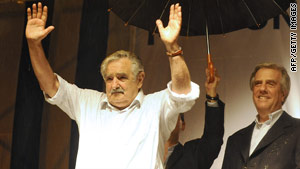 * Uruguay: Aside from Honduras there was another important election yesterday in Uruguay where former guerilla and ex-minister Jose Mujica became the new president-elect.
* Uruguay: Aside from Honduras there was another important election yesterday in Uruguay where former guerilla and ex-minister Jose Mujica became the new president-elect.* Brazil: Scotland Yard has reached a settlement with the family of Jean Charles de Menezes- a Brazilian migrant gunned down by police who mistook him for a potential terrorist.
* Peru: The government issued a “historical pardon” to the country’s Afro-Peruvian population for countless abuses and discrimination from the colonial era up to the present.
* Latin America: Pope Benedict XVI met with the Argentine and Chilean presidents over the weekend.
Image – CNN
Online Sources- LAHT, Reuters, AFP, CNN, Guardian UK
Honduras Vote Results
Press suggest that Sunday's poll day was mostly peaceful, with some reports of police repression of Zelaya supporters and other lowgrade violence in San Pedro Sula -- though nothing that will likely threaten the face-validity of the Sunday polls. Many polling stations even stayed open longer than anticipated in order to ensure that all voters in line could cast their ballot.
Recognition
Recognition of Sunday's results, however, is still, of course a sticking point: by my tally, countries that have voiced a strong stance one way or the other in the region thus far:
WILL RECOGNIZE: USA, Costa Rica, Panama -- both Peru and Colombia have issued statements suggesting they'll may recognize.
It's still unclear how many of the 4.6 million registered Honduran voters voted on Sunday, but it is likely to be higher than the (apparently unsettled figure of between) 45% - 56% that elected Zelaya in 2005 --- official TSE estimates have it at 61%, while the Zelaya camp is claming that abstention was at 45%. This number will undoubtedly factor in to the recognition decision of on-the-fence countries.
The Zelaya question
Meanwhile, what will happen to ousted President Zelaya remains very much a question mark. The Honduran Supreme Court issued a non-binding ruling last week that Zelaya should not retake office (14 / 15 judges). This Wednesday, a congressional vote is (finally) scheduled to take place on the fate of Zelaya, though most signs point to a negative vote for Zelaya, who himself has declared that he'll refuse to re-take the presidency even if the congress votes him back in at this late date. To date he remains holed up in the Brazilian embassy.
Lobo has said that if / when he takes office, he will be willing to talk to Zelaya and allow him to leave the Brazilian embassy without fear of arrest, though has not made clear whether he'll seek to issue a presidential pardon or continue to press charges if the congress votes to do so (Zelaya faces nearly 40 criminal charges).
Worth noting is that all 128 congressional seats and 298 mayors are also to be determined from Sunday's vote. (from 2005 election, liberal party had 62 and national party had 55). While the past five months have seen a relatively unified congress against Zelaya (Micheletti is from Zelaya's and Santo's Liberal party, remember), how the legislature shapes up will be key in determining how much cooperation the two parties maintain once the coup becomes prologue and governance questions take center stage for the new politicians in power.
Sources: La Prensa, El Heraldo, NY Times, Reuters, Bloggings by Boz
Sunday, November 29, 2009
Weekend Headlines: November 28-29, 2009
 * Latin America: According to according to an International Red Cross report “social and economic inequality” has caused the spread of AIDS throughout Latin America and the Caribbean.
* Latin America: According to according to an International Red Cross report “social and economic inequality” has caused the spread of AIDS throughout Latin America and the Caribbean.* Brazil: Was an environmental summit held in Brazil weeks before a major conference in Copenhagen a failure?
* Cuba: The country will celebrate its Day of Defense today as the armed forces winds down five days of major military exercises.
* Chile: FIFA backed down from its threat of taking away Chile’s spot in the World Cup after a local club dropped its lawsuit against the Chilean soccer federation.
Image – AFP (“A nurse draws blood from a patient for an HIV test in Johannesburg”).
Online Sources- LAHT, ESPN, Al Jazeera English, CNN